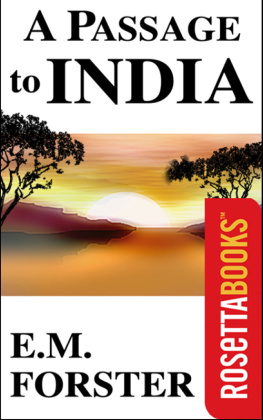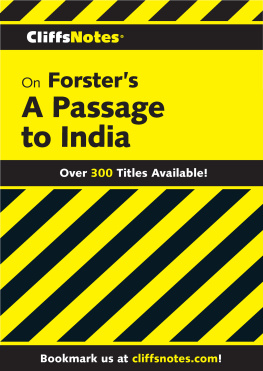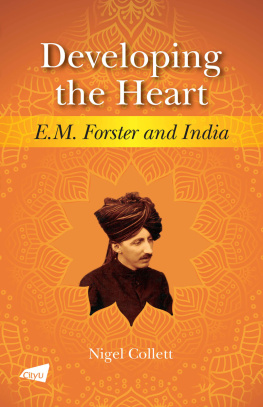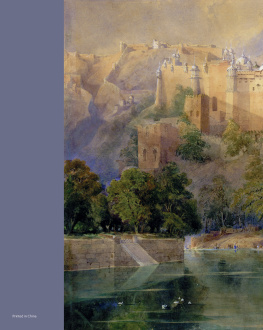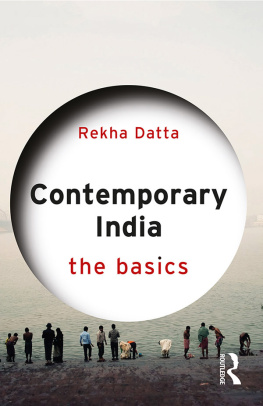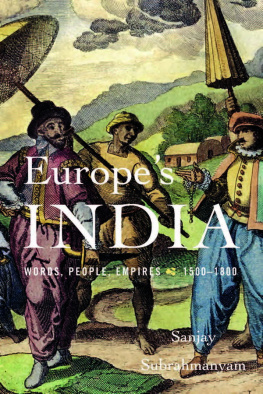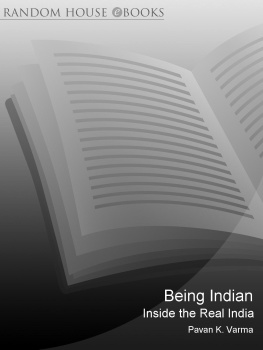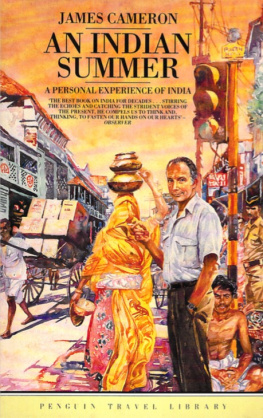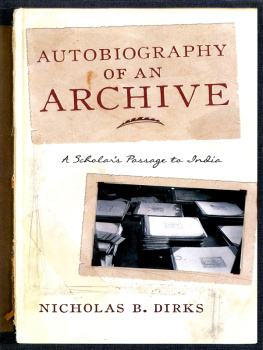Copyright
A Passage to India
Copyright 1924 by E. M. Forster
Cover art and eForeword to the electronic edition copyright 2002 by RosettaBooks, LLC
All rights reserved. No part of this book may be used or reproduced in any manner whatsoever without written permission except in the case of brief quotations embodied in critical articles and reviews.
For information address Editor@RosettaBooks.com
First electronic edition published 2002 by RosettaBooks LLC, New York.
ISBN 0-7953-0932-5
Contents
eForeword
Forsters 1924 masterpiece, A Passage to India, is a novel about preconceptions and misconceptions and the desire to overcome the barrier that divides East and West in colonial India. It shows the limits of liberal tolerance, good intentions, and good will in sorting out the common problems that exist between two very different cultures. Forsters famous phrase, only connect, stresses the need for human beings to overcome their hesitancy and prejudices and work towards realizing affection and tolerance in their relations with others. But when he turned to colonial India, where the English and the Indians stare at each other across a cultural divide and a history of imbalanced power relations, mutual suspicion, and ill will, Forster wonders whether connection is even possible.
The novel begins with people very much desiring to connect and to overcome the stereotypes and biases that have divided the two cultures. Mrs. Moore accompanies her future daughter-in-law Adela Quested to India where both are to meet Mrs. Moores son Ronny, the City Magistrate. Adela says from the outset that she wishes to see the real India and Mrs. Moore soon befriends an Indian doctor named Aziz. Cyril Fielding, an Englishman and the principal of a local government college, soon becomes acquainted with everyone, and it is his uneasy friendship with Dr.Aziz that constitutes the backbone of the novel.
Although the primary characters all take pains to accept and embrace difference, their misunderstanding, fear and ignorance make connection more difficult than any of them expect. Mrs. Moore and Adela Quested find that surpassing their preconceived notions and cultural norms entails confronting frightening notions about the contingency of their beliefs and values. Getting to know the real India proves to be a much more difficult and upsetting task than they had imagined. For Aziz, the continued indignities of life under British rule and the insults-intentional and unintentional-of his English acquaintances make him suspect that although friendship is desired, the two cultures are not yet ready for it.
Forsters keen eye for social nuance and his capacious sympathy for his characters make A Passage to India not only a balanced investigation of the rift that divides English and Indian but also a convincing and moving work of art. Written in 1924, two years after the publication of Eliots The Waste Land and Joyces Ulysses and one year before Woolfs Mrs. Dalloway, Forsters masterpiece was produced during one of the most remarkable periods of achievement in English literature since Wordsworths day.
RosettaBooks is the leading publisher dedicated exclusively to electronic editions of great works of fiction and non-fiction that reflect our world. RosettaBooks is a committed e-publisher, maximizing the resources of the Web in opening a fresh dimension in the reading experience. In this electronic reading environment, each RosettaBook will enhance the experience through The RosettaBooks Connection. This gateway instantly delivers to the reader the opportunity to learn more about the title, the author, the content and the context of each work, using the full resources of the Web.
To experience The RosettaBooks Connection for A Passage to India:
www.RosettaBooks.com/APassageToIndia
Chapter 32
EGYPT was charminga green strip of carpet and walking up and down it four sorts of animals and one sort of man. Fieldings business took him there for a few days. He re-embarked at Alexandriabright blue sky, constant wind, clean low coast-line, as against the intricacies of Bombay. Crete welcomed him next with the long snowy ridge of its mountains, and then came Venice. As he landed on the piazzetta a cup of beauty was lifted to his lips, and he drank with a sense of disloyalty. The buildings of Venice, like the mountains of Crete and the fields of Egypt, stood in the right place, whereas in poor India everything was placed wrong. He had forgotten the beauty of form among idol temples and lumpy hills; indeed, without form, how can there be beauty? Form stammered here and there in a mosque, became rigid through nervousness even, but oh these Italian churches! San Giorgio standing on the island which could scarcely have risen from the waves without it, the Salute holding the entrance of a canal which, but for it, would not be the Grand Canal! In the old undergraduate days he had wrapped himself up in the many-coloured blanket of St. Marks, but something more precious than mosaics and marbles was offered to him now: the harmony between the works of man and the earth that upholds them, the civilization that has escaped muddle, the spirit in a reasonable form, with flesh and blood subsisting. Writing picture post-cards to his Indian friends, he felt that all of them would miss the joys he experienced now, the joys of form, and that this constituted a serious barrier. They would see the sumptuousness of Venice, not its shape, and though Venice was not Europe, it was part of the Mediterranean harmony. The Mediterranean is the human norm. When men leave that exquisite lake, whether through the Bosphorus or the Pillars of Hercules, they approach the monstrous and extraordinary; and the southern exit leads to the strangest experience of all. Turning his back on it yet again, he took the train northward, and tender romantic fancies that he thought were dead for ever, flowered when he saw the buttercups and daisies of June.
Chapter 37
FRIENDS again, yet aware that they could meet no more, Aziz and Fielding went for their last ride in the Mau jungles. The floods had abated and the Rajah was officially dead, so the Guest House party were departing next morning, as decorum required. What with the mourning and the festival, the visit was a failure. Fielding had scarcely seen Godbole, who promised every day to show him over the King-Emperor George Fifth High School, his main objective, but always made some excuse. This afternoon Aziz let out what had happened: the King-Emperor had been converted into a granary, and the Minister of Education did not like to admit this to his former Principal. The school had been opened only last year by the Agent to the Governor-General, and it still flourished on paper; he hoped to start it again before its absence was remarked and to collect its scholars before they produced children of their own. Fielding laughed at the tangle and waste of energy, but he did not travel as lightly as in the past; education was a continuous concern to him, because his income and the comfort of his family depended on it. He knew that few Indians think education good in itself, and he deplored this now on the widest grounds. He began to say something heavy on the subject of Native States, but the friendliness of Aziz distracted him. This reconciliation was a success, anyhow. After the funny shipwreck there had been no more nonsense or bitterness, and they went back laughingly to their old relationship as if nothing had happened. Now they rode between jolly bushes and rocks. Presently the ground opened into full sunlight and they saw a grassy slope bright with butterflies, also a cobra, which crawled across doing nothing in particular, and disappeared among some custard apple trees. There were round white clouds in the sky, and white pools on the earth; the hills in the distance were purple. The scene was as park-like as England, but did not cease being queer. They drew rein, to give the cobra elbow-room, and Aziz produced a letter that he wanted to send to Miss Quested. A charming letter. He wanted to thank his old enemy for her fine behaviour two years back: perfectly plain was it now that she had behaved well. As I fell into our largest Mau tank under circumstances our other friends will relate, I thought how brave Miss Quested was and decided to tell her so, despite my imperfect English. Through you I am happy here with my children instead of in a prison, of that I make no doubt. My children shall be taught to speak of you with the greatest affection and respect.

